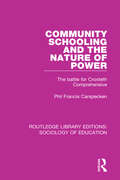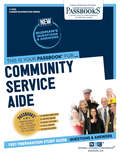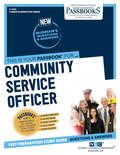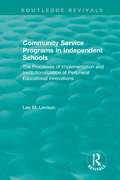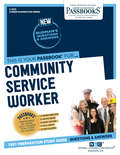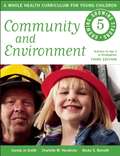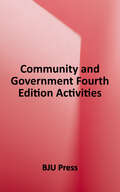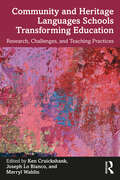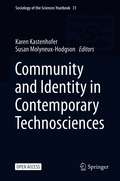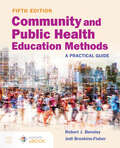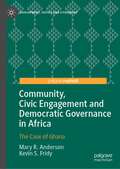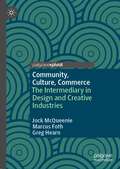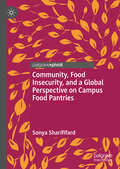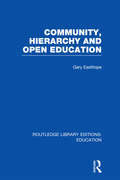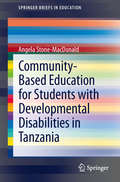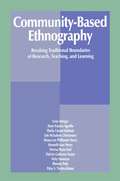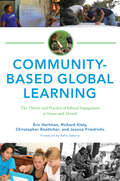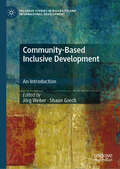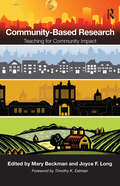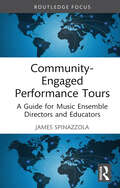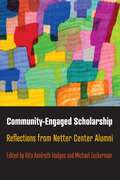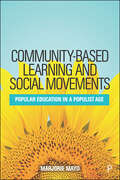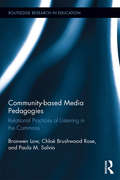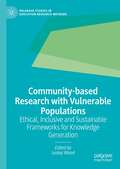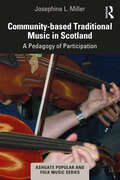- Table View
- List View
Community Schooling and the Nature of Power: The battle for Croxteth Comprehensive (Routledge Library Editions: Sociology Of Education Ser.)
by Phil Francis CarspeckenIn 1981, Liverpool Council ordered the closure of Croxteth Comprehensive School because of falling rolls. The local residents protested, and when this failed occupied the school and for a year ran it themselves with the help of volunteer teachers. Phil Carspecken was one of those volunteers, and this book, first published in 1991, tells the stor
Community Service Aide: Passbooks Study Guide (Career Examination Series #C-1402)
by National Learning CorporationThe Community Service Aide Passbook® prepares you for your test by allowing you to take practice exams in the subjects you need to study. It provides hundreds of questions and answers in the areas that will likely be covered on your upcoming exam, including but not limited to: Ability to understand and work with people in a variety of human services situations; Techniques of interviewing; Recordkeeping; and more.
Community Service Officer: Passbooks Study Guide (Career Examination Series #C-1404)
by National Learning CorporationThe Community Service Officer Passbook® prepares you for your test by allowing you to take practice exams in the subjects you need to study. It provides hundreds of questions and answers in the areas that will likely be covered on your upcoming exam, including but not limited to: basic organization and functions of a municipal law enforcement agency; procedures and work methods required to perform the full range of assigned duties; procedures and techniques for dealing with the public in a tactful but firm manner; photography and techniques of photo development and finger printing; and more.
Community Service Programs in Independent Schools: The Processes of Implementation and Institutionalization of Peripheral Educational Innovations (Routledge Revivals)
by Lee LevisonPublished in 1994, this book examines the processes through which independent school community service programs, as educational innovations, become more or less institutionalized in nine independent schools. The author considers school sponsored opportunities for students to serve in community-based organizations such as hospitals, day-care centres and nursing homes, and the aspects that influence the effectiveness of such programs. As a result of the study our understanding of the processes and factors that appear to be associated with program institutionalization are deepened. The rationales underlying independent school community programs are also examined. Finally the book raises questions for further research in independent schools regarding the nature of change, the program development process, and the role of affective education.
Community Service Worker: Passbooks Study Guide (Career Examination Series)
by National Learning CorporationThe Community Service Worker Passbook® prepares you for your test by allowing you to take practice exams in the subjects you need to study. It provides hundreds of questions and answers in the areas that will likely be covered on your upcoming exam, including but not limited to: working with clients in human services situations; data collection and decision making; arithmetic computations and interpretations; preparation and maintenance of written records and reports; interviewing; and more.
Community and Environment
by Becky S. Bennett Connie Jo Smith Charlotte M. HendricksChildren develop a sense of security and self-worth by becoming familiar with themselves, their home, and the world around them. Increase children's awareness of their own communities and the ways they can help within their home and environment with this Community and Environment curriculum. It will help children learn about their homes and neighborhoods, safety helpers, health helpers, consumerism, citizenship, and environmental education.The curriculum includesOverviews of the six community and environment topicsSuggested interest area materials and supports for creating the learning environmentLearning objectives and vocabulary words to introduce and useSuggestions for evaluating children's understanding of each topicMore than 30 hands-on classroom activitiesFamily information and take-home activitiesThis book is part of the Growing, Growing Strong series, a whole-health curriculum for children age three though kindergarten. Together, the books provide a complete
Community and Government Activities (Heritage Studies #2)
by BJUPressCommunity and Government Activities, 4th edition provides overprint answers to all activities in the corresponding activities.
Community and Heritage Languages Schools Transforming Education: Research, Challenges, and Teaching Practices
by Joseph Lo Bianco Ken Cruickshank Merryl WahlinThis edited book offers a new look at community and heritage languages schools around the world, providing a comprehensive and nuanced portrait of language education and cultural understanding in and beyond school contexts. Covering research and practice, the contributors survey the global landscape of community and heritage language schools and explore new developments in the field to understand the challenges the schools face and discuss the impact they have on their students and surrounding communities. Chapters address key topics including language development, academic achievement, professional development, learner identity and agency, online learning and teaching disruptions. Contributors highlight learners’ voices throughout, with special attention to overlooked minority language communities and Indigenous voices. Through this wealth of thorough and insightful analysis, the contributors of this book position students of community/heritage languages schools as citizens of a plurilingual world who are central to global change. Abounding with original research, innovative ideas and cutting-edge teaching practices, this book is ideal for courses on multilingualism and language and culture.
Community and Identity in Contemporary Technosciences (Sociology of the Sciences Yearbook #31)
by Karen Kastenhofer Susan Molyneux-HodgsonThis open access edited book provides new thinking on scientific identity formation. It thoroughly interrogates the concepts of community and identity, including both historical and contemporaneous analyses of several scientific fields. Chapters examine whether, and how, today’s scientific identities and communities are subject to fundamental changes, reacting to tangible shifts in research funding as well as more intangible transformations in our society’s understanding and expectations of technoscience. In so doing, this book reinvigorates the concept of scientific community. Readers will discover empirical analyses of newly emerging fields such as synthetic biology, systems biology and nanotechnology, and accounts of the evolution of theoretical conceptions of scientific identity and community. With inspiring examples of technoscientific identity work and community constellations, along with thought-provoking hypotheses and discussion, the work has a broad appeal. Those involved in science governance will benefit particularly from this book, and it has much to offer those in scholarly fields including sociology of science, science studies, philosophy of science and history of science, as well as teachers of science and scientists themselves.
Community and Public Health Education Methods
by Robert J. Bensley Jodi Brookins-FisherUpdated to keep pace with this ever-evolving field, the fifth edition of Community and Public Health Education Methods: A Practical Guide teaches students to effectively communicate health education messages and positively influence the norms and behaviors of both individuals and communities. Written by and for health education specialists, this text explores the methods used by health educators, including didactic techniques designed to guide others toward the pursuit of a healthy lifestyle. Divided into four sections, this well-organized guide begins with a focus on building the foundation for selecting and applying community and public health education methods. It then explores acquiring tools necessary for applying community and public health education and health promotion strategies. Section III examines health communication and media, including exploring social marketing concepts, applying health communication skills, using social media, and exploring digital media strategies.
Community, Civic Engagement and Democratic Governance in Africa: The Case of Ghana (Development, Justice and Citizenship)
by Mary R. Anderson Kevin S. FridyThis book explores how community influences civic engagement, focusing on the case of Ghana. It offers an interdisciplinary perspective to those studying psychology, political development and civic engagement in African countries. Previous research has shown that the social and economic context in which an individual interacts influences their political behaviors and attitudes, and that personal characteristics account for differences in political behavior and attitudes. This work moves away from the cultural demographics of a person, which often take center stage in existing investigations of partisan political behavior in the African context, and addresses the following five questions: (1) To what extent do individual traits influence civic engagement in Ghana? (2) To what extent is community identity similar or different in small rural villages versus large metropolitan areas in Ghana and how does community identity influence civic engagement? (3) To what extent does trust influence civic engagement in Ghana? (4) What factors and activities influence political knowledge and how does political knowledge influence civic engagement? (5) What is the status of women in civic engagement?
Community, Culture, Commerce: The Intermediary in Design and Creative Industries
by Marcus Foth Greg Hearn Jock McQueenieAs digital environments become increasingly individualised, instant, ubiquitous, and disintermediated, this book demonstrates the continuing relevance of intermediaries at the intersection of design, creativity, community engagement, and corporate social responsibility. The authors examine intermediaries as enablers of mutual benefit and offer a proactive, interventionist, and holistic approach to intermediation practice that steps beyond design thinking. By means of case studies that employ the 3C project design methodology—Community, Culture, Commerce—the authors provide an accessible introduction to intermediation at the nexus of theory and practice and signpost new opportunities for researchers and practitioners in the post-COVID environment.
Community, Food Insecurity, and a Global Perspective on Campus Food Pantries
by Sonya SharififardThis book explores food accessibility and its relationship to food security in communities representing high populations of college and university students. Each chapter offers readers a vivid and multifaceted perspective on food practices' cultural and social complexities and the current food system. Using insights from the multidisciplinary fields of food studies, educational leadership, and human geography, this book engages the global paradoxes of food. Food is individual and community-based, and students participating in school activities and extracurriculars must often choose between affording books or food. Each chapter begins with a case study and ends with suggested resources and activities. Chapter topics include academic success, identity and belonging, groceries, food media, public health, marketing, surplus and scarcity, and social impact. The book further blends concepts and empirical accounts to address the central issues of culture, structure, and accessibility within and among the food retail environment.
Community, Hierarchy and Open Education (Routledge Library Editions: Education)
by Gary EasthopeThe book describes the English school, especially the secondary school, as a hierarchical community in which the head-teacher (principal) is an autocratic ruler. After explaining how that particular organisation of the school developed historically from the market situation faced by the English public (i.e. private) schools in the developing industrial society of the nineteenth century it provides empirical evidence demonstrating that the hierarchies of knowledge, teachers and students that developed then were still in place when the book was published in 1975. They are still present today. It also looks at the challenges to the school as a hierarchical community presented by the ideologies of deschooling, progressive education and open education. Finally, it provides an explanation of why these ideologies were never put into practice in English schools despite some pioneering exemplars. Although first published over thirty-five years ago the issues examined in it raise questions that are still central to education today: Does size of school affect the commitment of teachers to the school, their colleagues and their students? How can the teaching staff be organised in a school? Do all need to work to the same ends? What is the role of leadership from the head-teacher (principal) in this? Is it possible to have a curriculum that is open without losing rigour? What should be the relationship between using local community knowledge and the educational wish to extend students’ horizons? The result is a short, nuanced, and densely argued text that demands thought and reflection from any contemporary educator.
Community-Based Education for Students with Developmental Disabilities in Tanzania (SpringerBriefs in Education)
by Angela Stone-MacdonaldBased on a yearlong ethnographic study, this book describes the daily life and work of the Irente Rainbow School, a special education school for students with developmental disabilities in Lushoto, Tanzania. It examines the use of local context, community funds of knowledge, culturally relevant pedagogy, and community support to teach students with disabilities important life skills, independence, self-advocacy and to fight for their human rights. This book offers several lessons for different audiences; it is a primer on disability and education in a rural African town, an alternative model for non-governmental agencies to consider in designing community-based and community-engaged programs, and a story about an exceptional group of teachers, students and families who took action to provide an education and a realization of rights for children with disabilities.
Community-Based Ethnography: Breaking Traditional Boundaries of Research, Teaching, and Learning
by Mary Frances Agnello Ernest T. Stringer Sheila Conant Baldwin Lois McFayden Christensen Deana Lee HenryCo-written by a professor and 10 students, this book explores their attempts to come to grips with fundamental issues related to writing narrative accounts purporting to represent aspects of people's lives. The fundamental project, around which their explorations in writing textual accounts turned, derived from the editor's initial ethnographic question: "Tell me about the [previous] class we did together?" This proved to be a particularly rich exercise, bringing into the arena all of the problems related to choice of data, analysis of data, the structure of the account, the stance of the author, tense, and case, the adequacy of the account, and more. As participants shared versions of their accounts and struggled to analyze the wealth of data they had accumulated in the previous classes -- the products of in-class practice of observation and interview -- they became aware of the ephemeral nature of narrative accounts. Reality, as written in textual form, cannot capture the immense depth, breadth, and complexity of an actual lived experience and can only be an incomplete representation that derives from the interpretive imagination of the author. The final chapter results from a number of discussions during which each contributing author briefly revisited the text and -- through dialogue with others and/or the editor -- identified the elements that would provide an overall framework that represents "the big message" of the book. In this way, the contributors attempted to provide a conceptual context that would indicate ways in which their private experiences could be seen to be relevant to the broader public arenas in which education and research is engaged. In its entirety, the book presents an interpretive study of teaching and learning. It provides a multi-voiced account that reveals how problematic, turning-point experiences in a university class are perceived, organized, constructed, and given meaning by a group of interacting individuals.
Community-Based Global Learning: The Theory and Practice of Ethical Engagement at Home and Abroad
by Eric Hartman Richard C. Kiely Jessica Friedrichs Christopher BoettcherInternational education, service-learning, and community-based global learning programs are robust with potential. They can positively impact communities, grow civil society networks, and have transformative effects for students who become more globally aware and more engaged in global civil society – at home and abroad. Yet such programs are also packed with peril. Clear evidence indicates that poor forms of such programming have negative impacts on vulnerable persons, including medical patients and children, while cementing stereotypes and reinforcing patterns of privilege and exclusion. These dangers can be mitigated, however, through collaborative planning, design, and evaluation that advances mutually beneficial community partnerships, critically reflective practice, thoughtful facilitation, and creative use of resources. Drawing on research and insights from several academic disciplines and community partner perspectives, along with the authors’ decades of applied, community-based development and education experience, they present a model of community-based global learning that clearly espouses an equitable balance between learning methodology and a community development philosophy.Emphasizing the key drivers of community-driven learning and service, cultural humility and exchange, seeking global citizenship, continuous and diverse forms of critically reflective practice, and ongoing attention to power and privilege, this book constitutes a guide to course or program design that takes into account the unpredictable and dynamic character of domestic and international community-based global learning experiences, the varying characteristics of destination communities, and a framework through which to integrate any discipline or collaborative project. Readers will appreciate the numerous toolboxes and reflective exercises to help them think through the creation of independent programming or courses that support targeted learning and community-driven development. The book ultimately moves beyond course and program design to explore how to integrate these objectives and values in the wider curriculum and throughout formal and informal community-based learning partnerships.
Community-Based Inclusive Development: An Introduction (Palgrave Studies in Disability and International Development)
by Shaun Grech Jörg WeberThis edited book responds to the theoretical vacuum on Community Based Inclusive Development (CBID) and accommodates the learning needs of students, researchers and practitioners looking to understand the conceptual underpinnings and practice dimensions of CBID, while developing new theoretical ground on CBID. Bringing together established and emerging scholars and practitioners, this edited volume seeks to: · Offer a theoretical, critical and interdisciplinary introduction for students, academics and practitioners working in CBID in the Global South. · Build new theory and knowledge that can inform research and practice. · Explore in-depth a range of issues through a critical lens and connect these with CBID. · Contribute evidence-based material for CBID programming and advocacy and inform the work of mainstream community development practitioners.
Community-Based Research: Teaching for Community Impact
by Mary Beckman Joyce F. LongCommunity-based research (CBR) refers to collaborative investigation by academics and non-academic community members that fosters positive change on a local level. Despite recent trends toward engaged scholarship, few publications demonstrate how to effectively integrate CBR into academic course work or take advantage of its potential for achieving community change. Community-Based Research: Teaching for Community Impact fills these gaps by providing: * An overview of language and methods used by professionals engaged in CBR* A framework for orienting CBR toward concrete community outcomes* Effective ways to integrate CBR into course content, student-driven projects, and initiatives spanning disciplines, curricula, campuses and countries* Lessons learned in working toward positive outcomes for students and in communitiesThis text is designed for faculty, graduate students, service-learning and other engaged learning and scholarship practitioners, alliance members, special interest groups, and organizations that desire to strengthen student learning and utilize research for improvement in their communities.
Community-Engaged Performance Tours: A Guide for Music Ensemble Directors and Educators
by James SpinazzolaCommunity-Engaged Performance Tours addresses the role of performance touring as a form of classroom and community engagement. Performance tours have long been a part of the collegiate and high school music ensemble experience, bringing student bands, choirs, and orchestras into connection with a wide variety of audiences, venues, and cultural contexts. This book presents a new approach to the performance tour that integrates touring with community engagement and service-learning. Emphasizing reciprocity, cross-cultural exchange, and global awareness, the author addresses how visiting ensembles can work with host communities instead of performing for them. The book includes student and community perspectives and case studies from the author’s experience leading university wind symphony tours in Haiti and the Dominican Republic, and provides a practical and hands-on model for ensemble leaders and educators.
Community-Engaged Scholarship: Reflections from Netter Center Alumni
by Rita Axelroth Hodges and Michael ZuckermanA collection of stories by Penn alumni whose lives were transformed by engaging with the West Philadelphia communityFor over thirty years, the Barbara and Edward Netter Center for Community Partnerships has served as the University of Pennsylvania’s primary vehicle for advancing civic and community engagement at Penn. The Netter Center develops and helps implement democratic, mutually transformative, place-based partnerships between Penn and its local geographic community of West Philadelphia. These partnerships advance research, teaching, learning, and service while improving the quality of life and learning in the community. One of the Netter Center’s primary objectives has been to educate Penn students to be creative, compassionate, ethical citizens who contribute significantly to improving the welfare of others—while they are students and throughout their lives and careers.Community-Engaged Scholarship is a collection of stories told by alumni of the University of Pennsylvania whose lives were profoundly shaped by engaging with the West Philadelphia community as students. Their reflections trace the linear relationship between their involvement in democratic community partnerships through Penn’s Netter Center and their current professional activities, primarily in academia, where they remain actively engaged in the struggle to build a more democratic and equitable society. The mutuality and humility that pervade these autobiographical accounts are the core of the democratic aspiration to which the Netter Center is and has always been dedicated. The stories are testimony to the Netter Center’s and founding director Ira Harkavy’s enduring influence on the next generation of community-engaged scholars and practitioners.Contributors: H. Samy Alim, Jeff Camarillo, Christina Cantrill, Tamara Dubowitz, Bernice Garnett, Rita Axelroth Hodges, John L. Jackson Jr., Jacqueline Kraemer, David Park, Jiyoung Park, Wendell Pritchett, Eric Schwartz, Margo Shea, Salamishah Tillet, Kim Van Naarden Braun, Michael Vazquez, Jason Yip, Andrew Zitcer, Michael W. Zuckerman.
Community-based Learning and Social Movements: Popular Education in a Populist Age
by Marjorie MayoThe rise of Far Right populism poses major challenges for communities, exacerbating divisions, hate speech and hate crime. This book shows how communities and social justice movements can effectively tackle these issues, working together to mitigate their underlying causes and more immediate manifestations. Showing that community-based learning is integral to the development of strategies to promote more hopeful rather than more hateful futures, Mayo demonstrates how, through popular education and participatory action research, communities can develop their own understandings of their problems. Using case studies that illustrate education approaches in practice, she shows how communities can engineer democratic forms of social change.
Community-based Media Pedagogies: Relational Practices of Listening in the Commons (Routledge Research in Education #179)
by Bronwen Low Paula M. Salvio Chloe Brushwood RoseParticipatory media is a tool for individual and community education and development, allowing students to express and share their ideas and opinions, and to contribute to the production of the commons. Vital to the storytelling in these community spaces is listening—the listening of project facilitators to participants, of participants to each other, and of the public to the stories that emerge through these projects. Community-based Media Pedagogies examines the role of listening across community media sites to explore its relational qualities and to identify the kinds of teaching and learning that happen in these spaces. Drawing on community media projects and pedagogies across New York, Toronto, and Montreal, this volume documents the stories of racialized and marginalized minority youth and immigrants, and explores which relations and spaces facilitate listening.
Community-based Research with Vulnerable Populations: Ethical, Inclusive and Sustainable Frameworks for Knowledge Generation (Palgrave Studies in Education Research Methods)
by Lesley WoodThis book advocates for community-based research with vulnerable populations within the field of higher education. The chapters outline how research can democratize knowledge generation to make it more accessible and socially relevant, and emphasizes the value of the lived and experiential knowledge of vulnerable and marginalized populations. Rooted in a critique of the current practices of higher education that fail to support participatory and transformative research, the research is structured at micro, macro and meso levels to ultimately emancipate colonized thinking of stakeholders about power, privilege and participation. Focusing primarily on various contexts within the Global South, the contributors argue that the time is ripe for community-based research which combines the theoretical knowledge of the academy with the local, experiential knowledge of those experiencing the consequences of social inequality to co-construct knowledge for change.
Community-based Traditional Music in Scotland: A Pedagogy of Participation (Ashgate Popular and Folk Music Series)
by Josephine L. MillerThis book examines the community-based learning and teaching of ‘traditional’ music in contemporary Scotland, with implications for transnational theoretical issues. The book draws on a broad range of scholarship and a local case study of a large organisation. A historical perspective provides an overview of new educational formats emerging from the mid-twentieth century folk music revival in Scotland. Practices through which participants encounter and perpetuate the idiom of traditional music include social music-making, learning by ear and participatory and presentational elements of musical performances. Individuals are shown as combining these aspects with their own learning strategies to participate in the contemporary community of practice of traditional music. The work also discusses how experiences of learning contribute to identity formation, including the role and practice of ‘tutors’ of traditional music. The author proposes conceptualising the teaching and learning of traditional music in community-based organisations as a ‘pedagogy of participation’.
